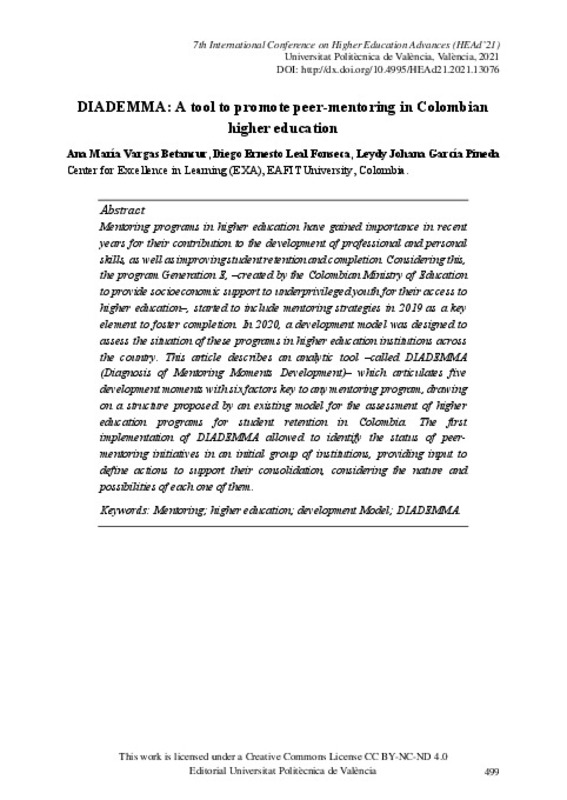JavaScript is disabled for your browser. Some features of this site may not work without it.
Buscar en RiuNet
Listar
Mi cuenta
Estadísticas
Ayuda RiuNet
Admin. UPV
DIADEMMA: A tool to promote peer-mentoring in Colombian higher education
Mostrar el registro sencillo del ítem
Ficheros en el ítem
| dc.contributor.author | Vargas Betancur, Ana
|
es_ES |
| dc.contributor.author | Leal Fonseca, Diego
|
es_ES |
| dc.contributor.author | García Pineda, Leydy
|
es_ES |
| dc.coverage.spatial | east=-74.297333; north=4.570868; name=Colòmbia | es_ES |
| dc.date.accessioned | 2021-09-14T07:04:28Z | |
| dc.date.available | 2021-09-14T07:04:28Z | |
| dc.date.issued | 2021-07-26 | |
| dc.identifier.isbn | 9788490489758 | |
| dc.identifier.issn | 2603-5871 | |
| dc.identifier.uri | http://hdl.handle.net/10251/172337 | |
| dc.description.abstract | [EN] Mentoring programs in higher education have gained importance in recent years for their contribution to the development of professional and personal skills, as well as improving student retention and completion. Considering this, the program Generation E, –created by the Colombian Ministry of Education to provide socioeconomic support to underprivileged youth for their access to higher education–, started to include mentoring strategies in 2019 as a key element to foster completion. In 2020, a development model was designed to assess the situation of these programs in higher education institutions across the country. This article describes an analytic tool –called DIADEMMA (Diagnosis of Mentoring Moments Development)– which articulates five development moments with six factors key to any mentoring program, drawing on a structure proposed by an existing model for the assessment of higher education programs for student retention in Colombia. The first implementation of DIADEMMA allowed to identify the status of peer-mentoring initiatives in an initial group of institutions, providing input to define actions to support their consolidation, considering the nature and possibilities of each one of them. | es_ES |
| dc.format.extent | 9 | es_ES |
| dc.language | Inglés | es_ES |
| dc.publisher | Editorial Universitat Politècnica de València | es_ES |
| dc.relation.ispartof | 7th International Conference on Higher Education Advances (HEAd'21) | |
| dc.rights | Reconocimiento - No comercial - Sin obra derivada (by-nc-nd) | es_ES |
| dc.subject | Higher Education | es_ES |
| dc.subject | Learning | es_ES |
| dc.subject | Educational systems | es_ES |
| dc.subject | Teaching | es_ES |
| dc.subject | Mentoring | es_ES |
| dc.subject | Development Model | es_ES |
| dc.subject | DIADEMMA | es_ES |
| dc.title | DIADEMMA: A tool to promote peer-mentoring in Colombian higher education | es_ES |
| dc.type | Capítulo de libro | es_ES |
| dc.type | Comunicación en congreso | es_ES |
| dc.identifier.doi | 10.4995/HEAd21.2021.13076 | |
| dc.rights.accessRights | Abierto | es_ES |
| dc.description.bibliographicCitation | Vargas Betancur, A.; Leal Fonseca, D.; García Pineda, L. (2021). DIADEMMA: A tool to promote peer-mentoring in Colombian higher education. En 7th International Conference on Higher Education Advances (HEAd'21). Editorial Universitat Politècnica de València. 499-507. https://doi.org/10.4995/HEAd21.2021.13076 | es_ES |
| dc.description.accrualMethod | OCS | es_ES |
| dc.relation.conferencename | Seventh International Conference on Higher Education Advances | es_ES |
| dc.relation.conferencedate | Junio 22-23, 2021 | es_ES |
| dc.relation.conferenceplace | València, Spain | es_ES |
| dc.relation.publisherversion | http://ocs.editorial.upv.es/index.php/HEAD/HEAd21/paper/view/13076 | es_ES |
| dc.description.upvformatpinicio | 499 | es_ES |
| dc.description.upvformatpfin | 507 | es_ES |
| dc.type.version | info:eu-repo/semantics/publishedVersion | es_ES |
| dc.relation.pasarela | OCS\13076 | es_ES |








